467. Such a dramatic place ought to
be illustrated by a koti type of glyph and
indeed we will find not only one but a pair of
them,
implying the twin faces of the Moon - or the ambivalent
Mercury (Hiro) - instead of the single steady
and reliable face of the Sun:
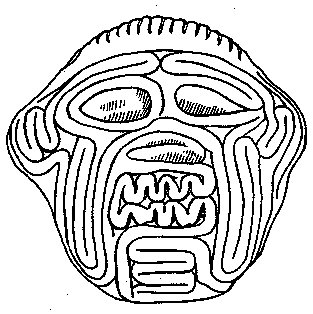
|
393 + 349 =
742
= 1½ * 366 + 193 |
|
174 |
157 |
136 |
200 |
75 |
= 742 |
|
348 |
314 |
272 |
400 |
150 |
= 1484 |
|
522 |
471 |
408 |
600 |
225 |
= 2226 |
|
2226 = 1½ * 1484 |
 |
128 |
 |
44 |
|
Ca3-12 (63) |
Ca7-24 (192) |
|
348 / 2 =
174
= 6 * 29 |
 |
155 |
zero |
|
Ca9-9 (237) |
|
314 / 2 =
157 |
|
120 |
 |
15 |
 |
199 |
 |
11 |
zero |
62 |
|
Cb6-6 (63 + 450) |
Cb6-22 (63 + 466) |
Cb14-8 (63 + 666) |
|
272 / 2 =
136 |
400 / 2 =
200
= 336 - 136 |
150 / 2 =
75 |
Let's therefore document all the 29
(→ Mercury) glyphs in line Cb6 (line 20 counted from
the beginning of the text):
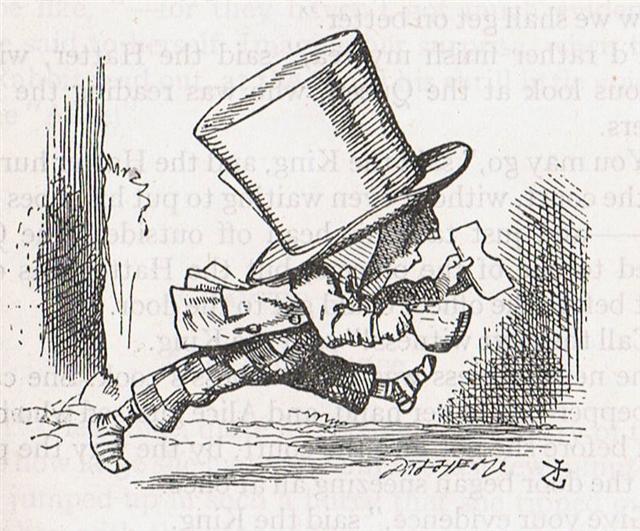
|
E haga o tere hia - te
manu |
manu gutu pao hia |
tagata |
te marama |
|
Tere. 1. To
run, to flee, to escape from a prison.
2. To sail a boat (also: hakatere);
tere vaka, owner of a fishing
boat. 3. (Deap-sea) fisherman; tere
kahi, tuna fisherman; tere ho'ou,
novice fisherman, one who goes deap-sea
fishing for the first time. Penei te
huru tûai; he-oho te tere ho'ou ki ruga
ki te hakanonoga; ana ta'e rava'a,
he-avai e te tahi tagata tere vaka i te
îka ki a îa mo hakakoa, mo iri-hakaou ki
te hakanonoga i te tahi raá. The
ancient custom was like this: the novice
fisherman would go to a hakanonoga;
if he didn't catch anything, another
fisherman would give him fishes to make
him happy so he'd go again one day to
the hakanonoga (more distant
fishing zones where larger fishes are
found). Vanaga. To depart, to run, to
take leave, to desert, to escape, to go
away, to flee, fugitive, to sail, to
row, to take refuge, to withdraw, to
retreat, to save oneself; terea,
rest, defeat; tetere, to beat a
retreat, to go away, refugee;
teretere, to go away, hurrah;
hakatere, to set free, to despatch,
to expel, to let go, to liberate, to
conquer, helmsman; terega,
departure, sailing; teretai, a
sailor. Churchill. |
 |
 |
 |
 |
|
Cb6-1 (508 = 365 + 135 + 8) |
Cb6-2 |
Cb6-3 (118 = 4 * 29½) |
Cb6-4 |
|
Star-25 (Horse) /
ANA-HEU-HEU-PO-5 (Pillar where debates
were held)
ALPHARD (The Horse) =
α
Hydrae
(142.3),
ω
Leonis (142.6),
τ¹
Hydrae (142.7) |
Al Tarf-7 (The End)
ψ
Velorum (143.3),
ALTERF =
λ
Leonis,
τ²
Hydrae (143.4),
ξ
Leonis (143.5) |
A Hydrae
(144.1)
VEGA (α Lyrae) |
UKDAH (Knot) = ι Hydrae
(145.4), κ Hydrae (145.5),
SUBRA = ο Leonis
(145.8)
*104 = *145.4 - *41.4 = *288 - *184 |
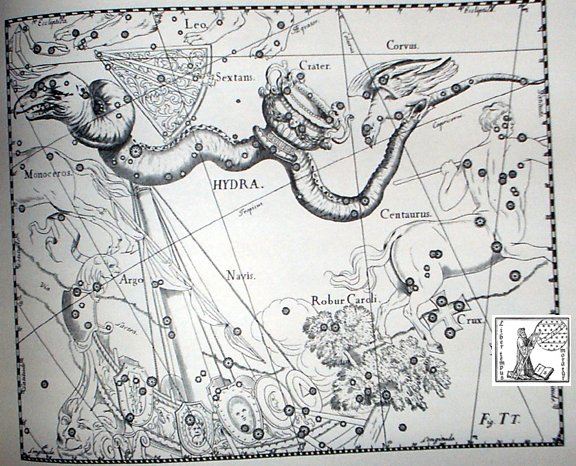 |
...
Finally the day arrived for launching the canoe,
and a great multitude assembled to see the
wonderful sight. The props were removed from the
sides of the canoe, and the men held it ready to
launch over the rollers. Hotu invoked the
gods Ta'aroa, Tane, 'Oro,
Ra'a, Ro'o, and Moe, to
their aid, and soon their presence was felt
impelling the canoe. The rollers began to move,
and then the canoe went forwards, slowly at
first as the men's hands steadied it and then
swiftly and well poised as it gracefully
descended alone and sat upon the sea, which rose
in great rolling waves caused by a wind sent to
meet it by the aster Ana-mua (Antares in
Scorpio), the parent pillar of the sky. The
spectators greatly admired Hiro's ship
and raised deafening shouts. Then the canoe was
made to drink salt water; it was dipped forwards
and backwards in the waves of the great moving
altar of the gods and thus consecrated to
Tane. A marae was made for him in the
little house aft of the deck, and the three
masts were rigged with ropes and strong mats for
sails and long tapa pennants streaming
from them ...
Within a few days the canoe was loaded with
provisions. Great fish baskets were made of
bamboo, filled with many kinds of fish, and
attached to the outside of the canoe so as to be
in the water. Bamboos and gourds were filled
with water and stowed away on board, and there
were fe'i, bananas, taro, and mahi
(fermented breadfruit) in abundance. A bed of
sand and stones was made upon the deck, upon
which to make a fire for cooking the food, and
soon Hiro was ready to go to sea. Hiro
was the captain and pilot, and he had other
competent seamen, who like him were acquainted
with the heavenly bodies and their rising and
setting. Women and children also accompanied
their husbands and fathers on board, and on one
fine day, with a strong favorable wind, they set
sail, applauded by many spectators, among whom
were prisoners of war (called tîtî),
whose shouts were heard above all others. They
saw Hiro's great pahi sail out to
sea and disappear beyond the horizon, never
again to return to Tahitian shores ...
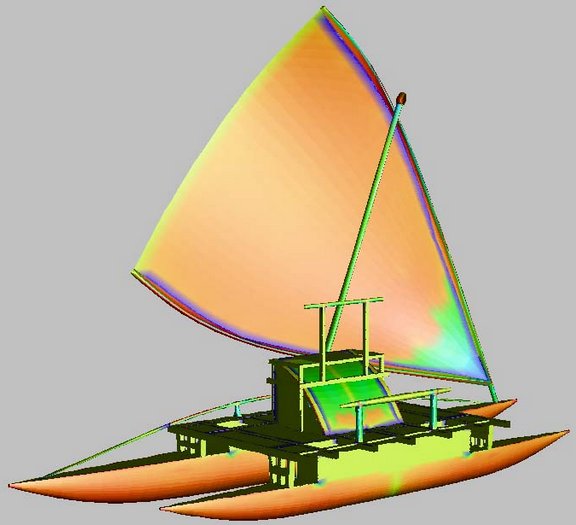
|
ihe tamaiti |
kotia - te hokohuki |
kava haati |
kiore |
te hokohuki |
kua tu te rau hei |
te moko - te hokohuki |
 |
 |
 |
 |
 |
 |
 |
|
Cb6-5 (512) |
Cb6-6 (121) |
Cb6-7 |
Cb6-8 |
Cb6-9 |
Cb6-10 |
Cb6-11 |
|
tu te rau hei |
ku hakahonui raua |
kiore |
hokohuki |
te rau hei |
te moko e te hokohuki |
 |
 |
 |
 |
 |
 |
 |
|
Cb6-12 |
Cb6-13 (520) |
Cb6-14 |
Cb6-15 (130) |
Cb6-16 |
Cb6-17 |
Cb6-18 |
|
kua tupu te mea ke |
 |
 |
 |
|
Cb6-19 (526) |
Cb6-20 |
Cb6-21 (136) |
|
kotia hia |
te kava tu |
kiore |
tu te ika |
te moko e te hokohuki |
 |
 |
 |
 |
 |
|
Cb6-22 (137) |
Cb6-23 |
Cb6-24 |
Cb6-25 |
Cb6-26 (533) |
|
kua tupu te
kihikihi |
ku kikiu |
te henua |
 |
 |
 |
|
Cb6-27 |
Cb6-28 |
Cb6-29 (536) |
|
AL SHARAS (The Ribs)
=
β
Crateris
(168.6) |
Al Zubrah-9 (The Mane) /
Purva Phalguni-11 (First Reddish
One)
ZOSMA (Girdle) =
δ
Leonis
(169.2),
COXA (Hips) =
θ
Leonis
(169.4)
*128 = *169.4 - *41.4 |
φ
Leonis (170.0),
ALULA
(First Spring of the Gazelle) =
ξ,
ν
Ursae Majoris
(170.5),
LABRUM =
δ
Crateris
(170.6) |
There were 80 days from Zosma
and Coxa to Antares.
... The rollers began to move, and then the
canoe went forwards, slowly at first as the
men's hands steadied it and then swiftly and
well poised as it gracefully descended alone
and sat upon the sea, which rose in great
rolling waves caused by a wind sent to meet
it by the aster Ana-mua (Antares in
Scorpio), the parent pillar of the sky ...
... According to Gylfaginning,
following the murder of Baldr by Loki, the
other gods brought his body down to the sea
and laid him to rest on the ship. They would
have launched it out into the water and
kindled a funeral pyre for Baldr but were
unable to move the great vessel without the
help of the giantess Hyrrokkin, who was sent
for out of Jötunheim. She then flung the
ship so violently down the rollers at the
first push that flames appeared and the
earth trembled, much to the annoyance of
Thor. Along with Baldr, his wife Nanna was
also borne to the funeral pyre after she had
died of grief. As Thor was consecrating the
fire with his hammer Mjolnir, a dwarf named
Litr began cavorting at his feet. Thor then
kicked him into the flames and the dwarf was
burned up as well
...
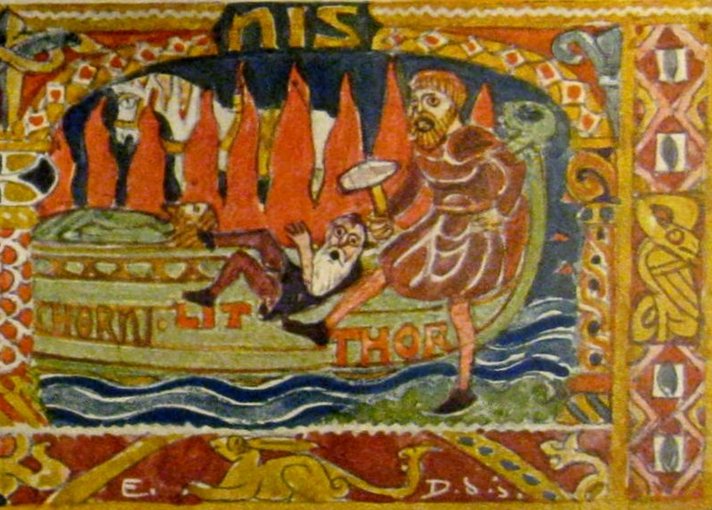
|

















